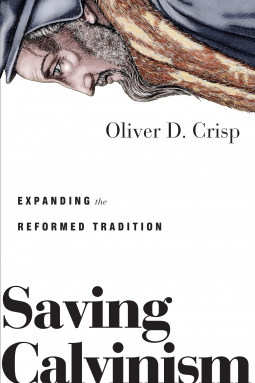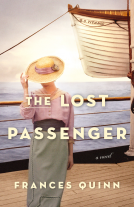
Saving Calvinism
Expanding the Reformed Tradition
by Oliver D. Crisp
This title was previously available on NetGalley and is now archived.
Send NetGalley books directly to your Kindle or Kindle app
1
To read on a Kindle or Kindle app, please add kindle@netgalley.com as an approved email address to receive files in your Amazon account. Click here for step-by-step instructions.
2
Also find your Kindle email address within your Amazon account, and enter it here.
Pub Date Dec 04 2016 | Archive Date Feb 14 2017
InterVarsity Press | IVP Academic
Description
For many, Calvinism evokes the idea of a harsh God who saves a select few and condemns others to eternal torment. Others find comfort in the Five Points of TULIP with its emphasis on the sovereignty of God's grace. Oliver Crisp thinks both sides have too small a picture of the Reformed tradition.
Saving Calvinism explores some of the thorniest problems in the Reformed tradition, including free will, the extent of the atonement, and the possibility of universal salvation. By engaging a host of Reformed thinkers and exploring often ignored ideas, Crisp shows that Calvinism is much more diverse and flexible than the stereotype suggests.
Advance Praise
"Oliver Crisp wants to save Calvinism—from some of its most
impassioned proponents. In this well-informed, wide-ranging, and very
readable book, a leading Reformed theologian addresses the burgeoning
'Young, Restless, and Reformed' movement. While applauding what he
recognizes as laudable in this resurgence of 'Calvinism,' he also offers
some timely cautions. Arguing that the so-called five points are
neither necessary nor sufficient, he invites contemporary Calvinists to
avail themselves of the full breadth of their tradition and the depths
of its considerable riches."
—Thomas H. McCall, Trinity Evangelical Divinity School
"Opinions will differ as to whether Calvinism indeed needs 'saving.'
Yet in this book, Oliver Crisp admirably succeeds in demonstrating that
the venerable house of Reformed theology contains unexplored rooms with
which today's Calvinists need to become familiar. In page after page, it
demonstrates lucid exposition of views that have been lost sight of,
along with crystal-clear delineation of ideas needing to be
distinguished. It also breathes an infectious charity."
—Kenneth J. Stewart, Covenant College, author of Ten Myths About Calvinism
Available Editions
| EDITION | Paperback |
| ISBN | 9780830851751 |
| PRICE | $18.00 (USD) |
| PAGES | 176 |
Featured Reviews
In Saving Calvinism Oliver Crisp provides an explores the diversity of thought in the tradition of Calvinism. This work first and foremost serves as a major correction to anyone who assumes that Calvinism is a monolithic theological system. As a Baptist I am appreciative of other theological traditions be they Calvinist, Weslyan, and others. Other traditions help us examine theological issues from another perspective and help open our eyes to how our own tradition might bias our interpretation of Scripture.
Crisp begins his work by defining what it means to be Reformed and in what ways Calvinism extends beyond the Reformed tradition. Regarding Calvinism he states, "It is a theological tradition that is broad and deep and that encompasses a range of different views within the bounds of a confessional approach to the Christian life, not all of which are commensurate with all of these five points, or theological emphases, though they are representative of much in that tradition." One cannot make sense of church history without making some allowance for diversity within the tradition of Calvinism. In the following chapters Crisp explores issues ranging from election, free will, universalism, and the nature and extent of the atonement.
I think the most helpful chapters in this work are chapters three, four, and six. In his third chapter he contrasts Jonathan Edwards understanding of the will, which is the one most often adopted by those espousing Calvinism, with that of John Giradeau who held that in some areas of life human beings do have the power of contrary choice. Giradeau's view of the will seems to parallel that found in confessional Lutheranism. In chapter three Crisp contrasts hopeful universalism and optimistic particularism. He cites Warfield and Shedd as examples of those who held to optimistic particularism as seen in their belief that all who are incapable of making a rational choice about faith in Christ will be saved, which I should note is distinct the Westminster Confession of Faith which argues only for the salvation of elect infants. Chapter six provides a cogent look into the long history hypothetical universalism has had within Calvinism, hypothetical universalism being the position that accepts the death of Christ being sufficient for all.
Whether Calvinist or not Crisp provides a look at the history of some key doctrines with which every Christian tradition must address at some point and the implications that possible responses have. I think one of Crisp's greatest strengths is his appeal to mystery. What many Calvinists and nonCalvinists do not make allowance for is the fact that some things are still a mystery to us and are not fully explained in Scripture. I do believe the greatest weakness of the work is his unwillingness to declare some beliefs beyond orthodoxy such as universalism.
Disclosure: I received an egalley of the book from the publisher for the purpose of reviewing it. The opinions I have expressed are my own, and I was not required to write a positive review
 Steve B, Reviewer
Steve B, Reviewer
The title begs the question - does Calvinism need saving? And if so from who or what? This book is in some ways both a sequel and an introduction to Crisp’s other books Deviant Calvinism: Broadening Reformed Theology (Fortress, 2014), Retrieving Doctrine: Essays in Reformed Theology (IVP Academic, 2011), and Revisioning Christology: Theology in the Reformed Tradition (Ashgate, 2011) - although this one is much shorter and more accessible than its precursors.
The aim is clearly stated:
‘It is an attempt to provide a Reformed perspective concerning human salvation that seeks to broaden what is thought of as “Calvinistic” when it comes to such matters—not so much by presenting a revision of Calvinism but by attempting to remind modern Calvinists of the breadth of resources at their disposal’ (9)
He uses the analogy of a house - much of modern Calvinism, often depicted as New Calvinism, only uses two rooms downstairs. Crisp’s goal is to open up the house. For Crisp Calvinism is broader than the TULIP five points. Although, he does look at each one of the five points
Calvinism is not the monolith most people assume it is - Crisp shows the diversity of Calvinism. Whether all Calvinists would agree is another issue! It is highly doubtful, for example, that this book would have been published by the Banner of Truth!
Crisp takes a fresh look at variants of Calvinistic theology. In chapters 2 and 3 he takes a look at election and freewill. Here he considers infra- and supralapsarianism and then draws upon Jonathan Edwards and John Giradeau. Girdeau opposed Edwards’ view of free will. (Crisp has dealt with Girardeau elsewhere (Crisp, 2014).) Crisp comments:
‘Even if Girardeau’s position is in some respects incomplete or underdeveloped, it does show that not all Reformed thinkers have been of one mind on the matter of theological determinism’
Crisp’s discussion on God permitting evil is particularly stimulating - here he introduces the notion of skeptical theism, by which ‘we don’t know why God permits evil, but we can trust that there is some good reason for doing so’.
Crisp maintains that it is possible to be a universalist and a Calvinist:
‘it seems to me that one can be a Calvinist and a universalist. However, even if Scripture does not support universalism, it is still possible to think that the purposes of God in salvation are much more expansive than is sometimes reported’.
Not all Calvinists endorse penal substitution - again Crisp shows penal substitution is the favoured view of most Calvinists not all have adopted this perspective. He examines several other ways of understanding the atonement these include: satisfaction, as developed by Anselm of Canterbury; vicarious penitence; and penal non-substitution. Crisp sensibly advocates not one model but kaleidoscopic meta-model approach.
He then goes on to look at hypothetical universalism as supported by John Davenant and John Preston. Although Crisp doesn’t endorse it he makes an excellent case for it being consistent with Calvinism.
The book is eminently readable and deserves a wide readership. Crisp has certainly shown that Calvinism has a wide theological range and is wider than the traditional five points seems to suggest - even though the five points provide a good summary they are not a theological straitjacket. Crisp even suggests that: ‘Holding to all of the five points is not, in fact, a necessary condition for being a Calvinist’. Although I don’t agree with all the points Crisp makes, the book does make for a stimulating and thought-provoking read.
Reference
Crisp, Oliver D 2014. John Girardeau: Libertarian Calvinist? Journal of Reformed Theology 8(3): 284-300.
Readers who liked this book also liked:
Patti Callahan Henry
General Fiction (Adult), Historical Fiction, Women's Fiction











